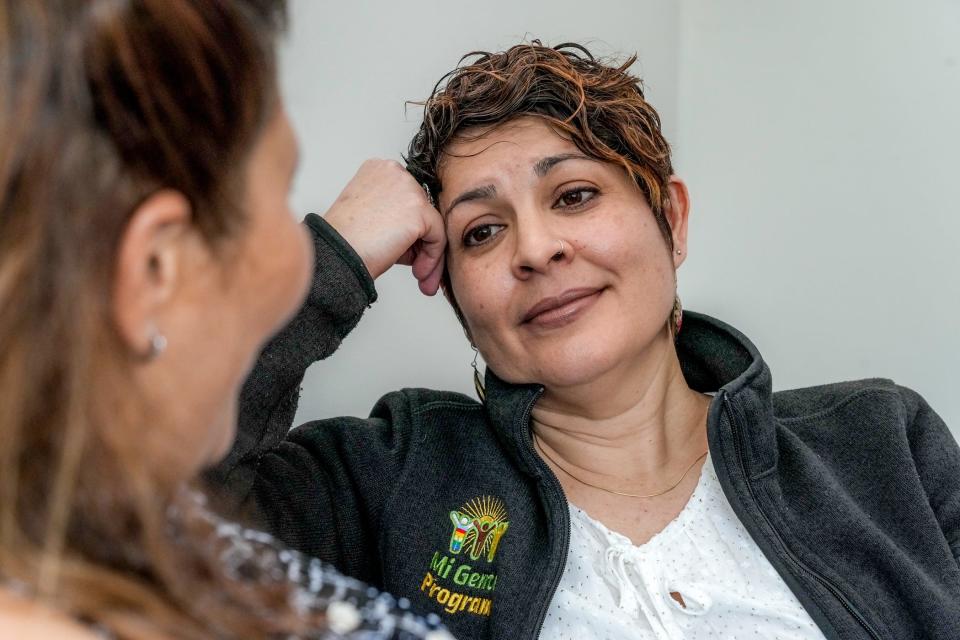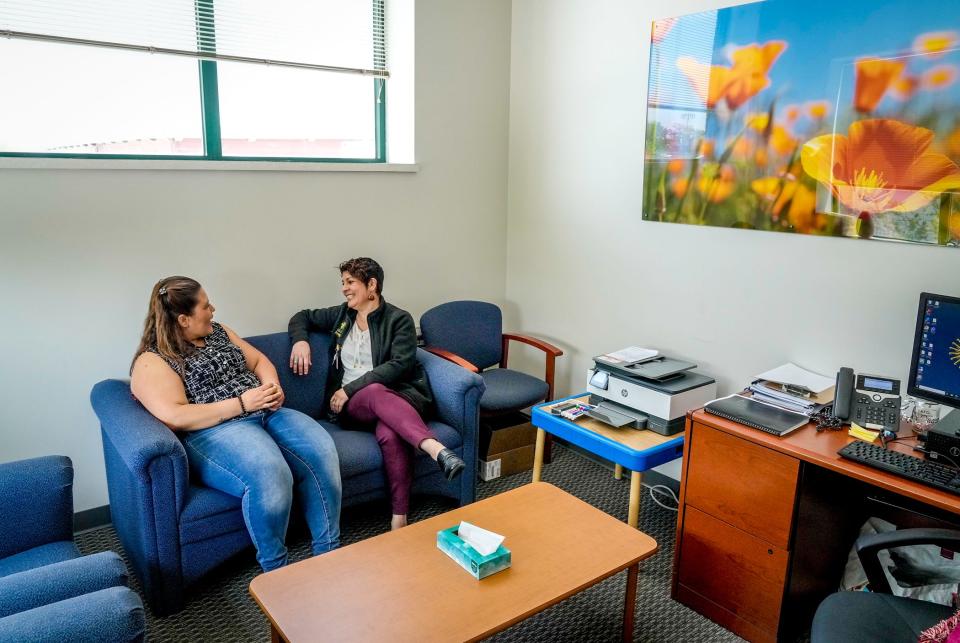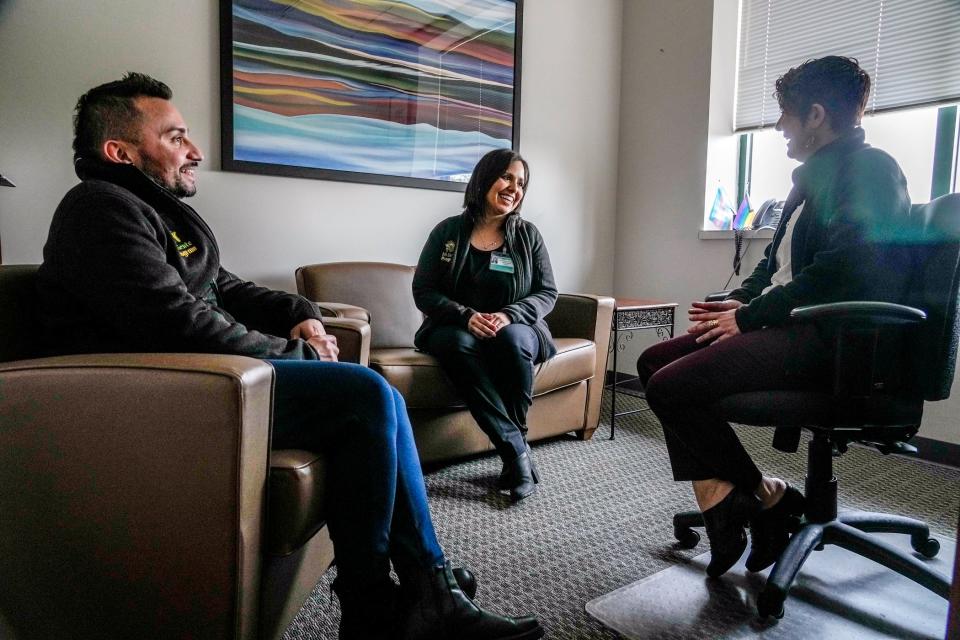Hispanic families in crisis call this RI psychologist an 'angel.' How she's saving lives.
Georgina Lopez shuddered as she described her first few months in Rhode Island. She and her two young daughters had left their native Puerto Rico after Hurricane Maria, a Category 5 storm, ravaged the island in 2017. The hurricane had traumatized her family, but moving to New England had been traumatic, too. The culture shock, the language barrier (Lopez and her daughters spoke no English, only Spanish) and all of the unknowns associated with living in a foreign place took a huge toll on the family. For six months, Lopez refused to fully unpack her suitcases, unsure they could make a life here.
Then, in the midst of all of her misery, Lopez met the woman she would come to describe as her "angel on earth.” The connection was made when school officials recommended that her older daughter, who was struggling with anxiety, seek treatment with Yovanska Duarté-Vélez, a clinical psychologist at Bradley Hospital. Duarté-Vélez proved to be a godsend, not only because she specialized in Hispanic youths and families, but because she also happened to be Puerto Rican and fluent in Spanish and English.

Women in Action: How is this RI foster care innovator transforming young lives and gaining national praise?
“Seeing someone who understands our culture and speaks our language has been amazing,” Lopez said, in Spanish. Before long, she started to see her teenage daughter's anxiety subside, and Lopez became a true believer in therapy, even seeking treatment herself from Duarté-Vélez. “She has been a huge help in channeling my anger and fears,” she said. “I’m a calmer person and have a much better relationship with my daughters.”
What is culturally responsive therapy?
Lopez’s firsthand experience with culturally responsive therapy (also known as socio-cognitive behavioral therapy) goes to the heart of Duarté-Vélez’s work. After obtaining her doctorate in clinical psychology from the University of Puerto Rico in 2007, Duarté-Vélez expanded her research to include the impact of addressing identity (factors such as ethnicity, culture, language and sexual orientation) in the treatment of children and teens on the island. In 2013, she moved to Rhode Island to join the Department of Psychiatry and Human Behavior at Bradley Hospital and Brown University. It was here that she conducted a pilot program to study the effectiveness of socio-cognitive behavioral therapy on Hispanic youths who were suicidal.
“We got excellent results,” she said. “The socio-cognitive behavioral therapy for suicide behavior was better than the traditional treatment. After 12 months, patients on this new treatment reattempted suicide less than people on the usual treatment.”
That pilot program led to a five-year federal grant to further study this new culturally responsive therapy. “Identity is very important for us to see the context of things affecting the family,” Duarté-Vélez explained. “We think of immigration, migrating to a new country – the cultural conflict that usually exists between the youth who are raised here and the parents who were raised in their [home] country, or have those values more ingrained.”
The study is ongoing. So far, she has enrolled 103 Hispanic patients, ages 12 to 17, who have been hospitalized because they attempted suicide. “We have a lot of trauma in our sample,” she said. “We see a lot of LGBTQ+ kids. Their identity is something their family may not feel comfortable with, or may reject, because of their culture or religious beliefs.”
Women in Action: Is the Ivy League unreachable? One educator is changing what RI students think possible
RI kids in crisis since pandemic, with Hispanic youths at even greater risk
Duarté-Vélez’s research is even more pressing given the explosion of mental health concerns among young people since the pandemic. According to the Centers for Disease Control and Prevention’s 2021 Youth Risk Behaviors Survey, 38% of Rhode Island high schoolers experienced prolonged periods of sadness or hopelessness in the previous year. Seventeen percent seriously considered taking their own lives, and an alarming 10% attempted suicide. In each category, Hispanic teens ranked higher than their white peers. Especially affected were Latina girls, 58% of whom reported feeling sad or hopeless to the point that they could not participate in regular activities and 18% of whom attempted suicide.

These glaring statistics, coupled with Duarté-Vélez’s clinical research, led her to open the Mi Gente clinic in Pawtucket last September. Mi Gente, which is Spanish for “my people,” is part of Bradley Hospital’s Child and Outpatient Services at Gateway Healthcare. The program caters to Spanish-speaking families with children ranging in age from 12 to 21 who are experiencing mental health challenges.
“We want to provide evidence-based, quality treatment that’s short-term, and provide support for around six months,” she said. “Mi Gente was always in my heart, in the sense that I wanted to have a space where ‘regular’ people in the community could go, that was accessible to them. They don’t need to wait for a crisis and end [up] in the emergency room with their youth who attempt suicide. They can see if their youth are having a hard time, if they’re feeling depressed. If they [notice] changes, I want them to have an option.”
Since the clinic opened, Duarté-Vélez and clinical psychologist Gisela Jimenez-Colon have treated 26 families. There’s a waiting list.
“There is so much need [for mental health services] in the Latino community,” said Jimenez-Colon, who is also Latina and speaks fluent Spanish. “I love working with my people and having this program where we can speak their language and understand their culture.”
Women in Action: Eleanor Dove Harris is a proud advocate for Narragansett Tribe
Mark Patinkin: This RI high schooler is pen pals with a player on the NY Jets. Why it may save his life.
The initial success of the bilingual and bicultural clinic has helped secure additional funding for the program. Earlier this year, a grant from the CVS Health Foundation made it possible to hire a community health worker to support patients’ families with any social determinants of health they may be facing. While the children are in their therapy sessions, Wiston Delgado builds relationships with their parents, connecting them to other community resources if they’re experiencing financial hardship or trouble handling immigration issues.
Duarté-Vélez recently secured another grant, this time from the American Foundation for Suicide Prevention, which will help her hire an additional psychologist and other personnel, to continue expanding the services provided at the clinic.

Lessons from mom: How Duarté-Vélez realized her mental health vocation
As far back as fifth grade, Duarté-Vélez knew she wanted to become a psychologist. “It was in my heart,” she said. “Kids my own age used to come to me and tell me their problems. And, I would listen to them and give them advice.” She went on to study psychology at the University of Puerto Rico. But, it wasn’t until a summer internship at Pennsylvania State University that she began to focus on youth suicide.
“I think that perhaps because I love life so much, I was surprised that kids so young were thinking about suicide,” she said. “I was thinking that something was going on in their life that was awful.” When she returned to Puerto Rico, she started specializing in depression in children and teens.
Women in Action: RI food entrepreneur Sterling Clinton-Spellman is cooking up new restaurant, jobs program
She eventually relocated her family to Rhode Island so she could continue growing as a clinical researcher. She also brought with her the parenting lessons instilled in her by her mother. “When I teach people what is a healthy way of parenting, what I read in the psychology books, I thought: this is my mother,” she said. “She’s so intelligent and strategic. She became our friend, but she was mom first. It was the perfect balance because she puts limits, but she also gave us the chance to make decisions.”
Overcoming the cultural barriers to mental health care
These insights have gone a long way to helping patients like Georgina Lopez and her daughters. Lopez’s youngest is now a patient at the Mi Gente clinic.
“Gisela [Jimenez-Colon] has taught my daughter coping mechanisms for when she’s feeling stressed or anxious,” Lopez said. “The doctor has also shown me techniques for asking questions that will elicit answers from my daughter and help me get a conversation going with her.”
Lopez has become an advocate for the clinic, spreading the word to others in her Central Falls community, who often reject therapy because of the stigma associated with mental health issues.
Women in Action: Women in Action: Ancient grain fuels modern dream for Providence entrepreneur
Women in Action: One woman's amazing effort to help coastal communities defend themselves from rising seas
“It’s OK to ask for help,” said Duarté-Vélez. “Mental health is just as important as physical health.” That’s the message she’s constantly communicating to the Latino community. She’s also continuing to inspire other bicultural and bilingual professionals to join her in this groundbreaking work.
“She always motivates me as a role model,” said Jimenez-Colon. “She is a Latina woman doing all of this. I know how passionate she is about her work.”
From developing effective culturally responsive therapies to expanding access to this specialized treatment through the Mi Gente program, this pioneering psychologist keeps breaking down barriers to quality care in the community.
“There are nuances in the way we were raised, the way we see the world, the way the family is defined,” Duarté-Vélez said. “Diversity is beautiful. We just have to embrace those differences. This is a country of diversity. We all, in certain ways, are immigrants. But we need to understand the new [people] that come in order to make them a part of this country.”
— Patricia Andreu, a freelance journalist living in Providence, writes Women In Action, a periodic column. Reach her at WomenInActionRI@outlook.com and follow her on Twitter: @ri_women.
Where to turn if you are considering suicide:
Anyone in immediate danger should call 911.
Other resources:
Prevent Suicide in Rhode Island: a Rhode Island Department of Health resource. If you are in crisis, call (800) 273-8255 or text TALK to 741741. Website: https://preventsuicideri.org/
BHLink: For confidential support and to get connected to care, call (401) 414-LINK (5465) or visit the BHLink 24-hour/7-day triage center at 975 Waterman Ave., East Providence. Website: https://www.bhlink.org
The Samaritans of Rhode Island: (401) 272-4044 or (800) 365-4044. Website: samaritansri.org
The National Suicide Prevention Lifeline: Call 988, or (800) 273-TALK, or (800) 273-8255
The Crisis Text Line: Text HOME to 741741 “from anywhere in the USA, anytime, about any type of crisis.”
Butler Hospital Behavioral Health Services Call Center: Available 24/7 “to guide individuals seeking advice for themselves or others regarding suicide prevention.” (844) 401-0111
Mental health resources for children, adolescents and their families
Mi Gente clinic at Bradley Hospital: (401) 667-6582, migente@Lifespan.org
Mindful Teen: https://www.lifespan.org/centers-services/mindful-teen-dbt-program or call (401) 432-1119
Kids' Link RI: https://www.lifespan.org/centers-services/kids-link-ri or call (855) 543-5465
Mindcast: Healthy Mind, Healthy Child Podcast: https://www.lifespan.org/locations/bradley-hospital/mindcast-healthy-mind-healthy-child-podcast
Butler Hospital's Adolescent Treatment Unit: https://www.butler.org/services/inpatient/adolescent or call Patient Assessment Services at (844) 401-0111.
This article originally appeared on The Providence Journal: Hispanic youths with mental health struggles find hope at RI clinic

